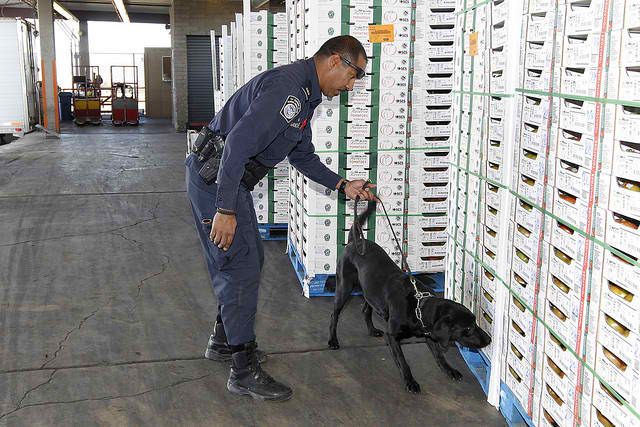The use of police drug dogs is becoming ever more popular in the day-to-day functions of law enforcement. With such use the courts are being sought for guidance on how far is to far and what are the limits. A Florida case is the first by the U.S. Supreme Court to tackle when can police use a drug dog and when is it a search requiring a warrant.
Following an anonymous, unverified tip given to the Miami-Dade Police Department that Joelis Jardines home was a marijuana grow house, members of the DEA responded a month later with a K-9 officer and his drug sniffing dog. The dog handler walked up to the front porch of the home where the dog began sniffing the base of the front door and alerted to the presence of drugs inside.
On that basis, a search warrant was obtained and then executed on the residence where police recovered numerous marijuana plants inside the home, Jardines attempted to flee and was charged with trafficking in marijuana.
Drugs were Suppressed
At trial, Jardines successfully moved to suppress the evidence (marijuana plants) arguing that the search was unreasonable under the Fourth Amendment. The Florida District Court of Appeal reversed. On petition, the Florida Supreme Court quashed the decision of the Court of Appeal and upheld the trial Court’s decision to suppress the evidence holding that the use of a drug dog to investigate Jardines home was a search unsupported by probable cause.
The U.S. Supreme Court granted cert in Florida v. Jardines, limited to the question of whether the officer’s behavior was a search under the Fourth Amendment.
Issue
Whether police violated the Fourth Amendment by taking a drug-sniffing dog to a house where the officers, without probable cause, suspected was a marijuana grow house.
Analysis
Government’s argument:
Florida claimed an officer and his drug-sniffing dog were lawfully present outside Jardines front door because a police officer not armed with a warrant may approach a home and knock, precisely because that is “no more than any private citizen might do.” Furthermore, under Supreme Court precedent, a dog sniff does not constitute a Fourth Amendment search requiring probable cause, citing U.S. v. Place, City of Indianapolis v. Edmund, and Illinois v. Caballes.
Place held that a dog sniff of luggage at an airport did not violate the Fourth Amendment because the sniff does not expose the privacy of the luggage owner in the same manner as a manual search by a police office. Edmund held that a dog sniff of a car did not constitute a Fourth Amendment search because the sniff could only disclose the presence or absence of narcotics and did not involve government intrusion into private and intimate areas, given that the dog only walked around the vehicle. Finally, in Caballes, the Court held that a dog sniff of a car did not constitute a Fourth Amendment search because a dog sniff could only reveal the presence or absence of contraband, and there is no legitimate private interest in contraband.
Jardine’s argument:
Jardines argued that the dog sniff violated his Fourth Amendment rights because special protection is offered to the home and police violated his expectation of privacy by unlawfully entering his property without a warrant. He noted that none of the cases cited by Florida involved K-9’s and a home and therefore, are clearly distinguishable to his case.
The Supreme Court found that when it comes to the Fourth Amendment, the home is first among equals. A license may be implied from the habits of the country, where it has been recognized that the knocker on the front door is treated as an invitation or license to attempt entry. This implicit license typically permits the visitor to approach the home by the front path, knock promptly, wait briefly to be received, and then (absent invitation to linger longer) leave.
But introducing a trained police dog to explore the area around the home in hopes of discovering incriminating evidence is something else. There is no customary invitation to do that. An invitation to engage in canine forensic investigation assuredly does not inhere in the very act of hanging a knocker. The scope of a license— express or implied—is limited not only to a particular area but also to a specific purpose. Consent at a traffic stop to an officer’s checking out an anonymous tip that there is a body in the trunk does not permit the officer to rummage through the trunk for narcotics. Here, the background social norms that invite a visitor to the front door do not invite him there to conduct a search.
Get a warrant
One virtue of the Fourth Amendment’s property-rights baseline is that it keeps easy cases easy. That the officers learned what they learned only by physically intruding on Jardines’ property to gather evidence is enough to establish that a search occurred and therefore affirmed the Supreme Court of Florida’s decision to suppress the evidence.

